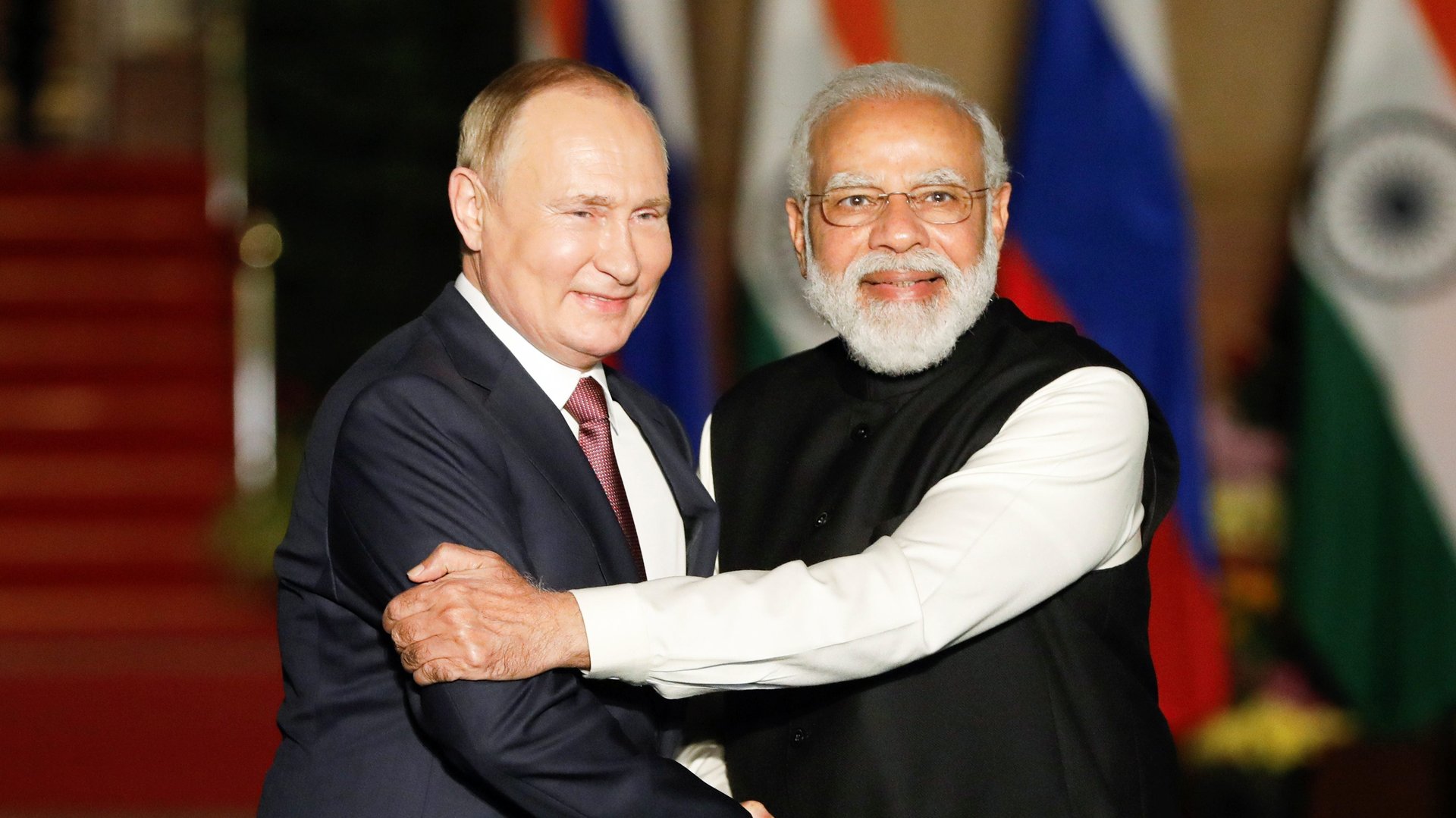India is walking a tightrope between Ukraine and Russia
India finds itself in a geopolitical quagmire between Russia and Ukraine.


India finds itself in a geopolitical quagmire between Russia and Ukraine.
On the one hand, it has a time-tested relationship with Russia, hinged on defence and bilateral trade deals, and on the other, it needs allies and trade partners like the US to counterbalance China’s growing influence in the region. India also needs to keep an eye on countries supporting Pakistan and China, given its own border tensions with the two neighbouring nations.
“One of the major reasons why India doesn’t want to jeopardise its ties with Moscow is that it sees Russia as a guarantor of multipolarity. India favours a world order where multiple powers balance each other out,” said Michael Kugelman, deputy director of the Asia programme and senior associate for south Asia at the Wilson Center. “The Ukraine conflict, by driving Russia into China’s arms, hampers India’s ability to promote more multipolarity.”
And while India’s relationship with Ukraine is strong even if unspectacular, Kugelman says it pales in comparison to its ties with Russia.
This is reflected in trade.
India’s trade with Russia and Ukraine
Neither country has trade volumes with India as high as the US in absolute terms. Russia is now India’s 25th biggest trading partner. These countries constitute over 75% of India’s total trade.
India imports oil and related products from both Russia and Ukraine. But while it imported goods worth $1.9 billion from Ukraine between April and December 2021, the figure for Russia stood at $6.9 billion, according to data from the Indian ministry of commerce and industry.
This is still a fraction of India’s $55 billion in exports to, and $31 billion in imports from, the US for the same period.
But the absolute volumes become less significant in the larger picture.
Indo-Russian defence ties
Russia continues to be India’s top defence supplier, with new deals as recent as December 2021 during Russian president Vladimir Putin’s visit to New Delhi.
During this meeting with Indian prime minister Narendra Modi, Putin called India a “great power,” setting the stage for a renewal of the two nations’ defence cooperation deals for the next decade. This visit also ended in an agreement to manufacture Russian AK-203 rifles in India’s Uttar Pradesh, with a technology transfer from Russia.
These deals, and particularly a $5.5 billion deal for India to purchase S-400 Triumf surface-to-air missiles from Russia, have not sat well with the US. Under the Countering America’s Adversaries Through Sanctions Act, India could have faced sanctions for this deal, especially once deliveries began in November 2021 after the deal was signed in 2018.
However, the changed world order, especially the importance of India as an ally against China, has led the Joe Biden administration to not levy these economic strictures.
“The administration has made clear that it is discouraging India from proceeding with the acquisitions of Russian equipment, and there are important geostrategic considerations, particularly with…relationship to China. So, I think we have to look at what the balance is,” James O’Brien, the US State Department’s coordinator for sanctions policy, said on Jan. 14, according to a Times of India newspaper report.
The US’s desire to have India in its mix of allies is also reflected in Biden’s response to a press query on the matter. “We are going to have consultations with India (on the Ukrainian crisis). We haven’t resolved that fully,” Biden told reporters on Feb. 24.
India’s next steps will be determined by its past with Russia, and its future with its allies.
What will India do in the Russia-Ukraine crisis?
Geopolitical experts see India’s relationship with Russia as one of New Delhi’s oldest, most stable, and consistent.
“Indian leaders like to note that there’s never been a crisis in relations with Russia and that it’s simply a partner that can be depended on, full stop,” Kugelman said. There is also a hint of nostalgia, that Russia is among India’s oldest friends (pdf), dating back to the partition in 1947 and the country under Jawaharlal Nehru’s leadership.
But Russia’s growing ties with Pakistan and China—and India’s increasing closeness to the US—have undercut this friendship to some degree. Each bloc appears to now be courting the others’ rivals. Given India’s membership in the Quad, the alliance it has with the US, Australia, and Japan, it may now find itself painted into a corner over Russia, and may be forced to take a more decisive stance.
While Modi’s office released a statement saying the prime minister had spoken to Putin about resolving the crisis diplomatically and de-escalating military aggressions, this may not be seen as a strong enough statement.
“Traditionally, in deference to its Russian friend, India has stayed quiet about Russian aggression. But that’s harder to do this time around, given that this arguably marks Russia’s most egregious aggression since the end of the Cold War,” Kugelman said.
In this scenario, if it resists the pressure to call out Russia, India could find itself isolated on the Russia issue, and it could face tensions with key partners.
“India’s safest bet may be to refrain from public criticism of Russia, and instead take a harder line privately and demand that Moscow deescalate,” according to Kugelman. But given the current circumstances, “even if it tries, an emboldened Putin may be impossible to deter.”